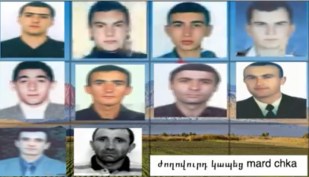Since 2008, when Nikol Pashinyan was unleashed upon the Armenian nation we believe by Turkey, and other foreign power a relentless wave of death and destruction has swept over Armenia and Artsakh.


Pashinyan’s Turkish Dream began with a massive attack on the Armenian government, leading to the massacre of ten people, including a policeman, and causing hundreds of injuries. After six months in hiding, he was captured and sentenced to seven years in prison, but disappointingly, he was granted amnesty by the president and released after just two years. In 2018, Pashinyan returned with a thirst for revenge and continued his harmful actions against Armenia and Artsakh, collaborating with Turkey and Azerbaijan, traditional foes of Armenia.

Today, Armenia grapples with governance challenges brought on by corrupt traitors who have failed to safeguard the nation and Artsakh. As a former defense minister, now under arrest, pointed out, Armenia faced numerous setbacks during the 1992-1994 war period but refused to surrender. Under strong leadership, Armenians regrouped and achieved victory in the first Artsakh war. However, the corrupt government in 2020 chose to capitulate, leaving 120,000 Armenians in Artsakh under siege, facing starvation, and the threat of genocide. These rulers colluded with the enemy, exposing the entire Armenian nation to vulnerability, echoing the tragic events of 1915, now with Artsakh facing a similar fate.
During the 2020 war, Pashinyan not only secretly surrendered but also failed to consult with the president, parliament, defense minister, or minister of foreign affairs, keeping his actions shrouded in secrecy.
Pashinyan has placed Armenia in an exceedingly difficult situation, with no Armenians willing to take up the responsibility of governance. Not a single political party in Armenia dares to challenge Pashinyan’s position. Anyone considering a leadership role faces a daunting dilemma: they must either risk potential warfare to protect Armenia and Artsakh or choose the arduous path of surrender.

An epoch-defining juncture in Armenian history emerged when a single individual, backed by foreign forces, succeeded in fracturing, and demoralizing the entire nation. With no viable political organization or civilian effort to counter this threat, only Armenia’s military remains entrusted with the responsibility of safeguarding the nation’s survival. Consequently, it falls upon the Armenian people to exert every possible effort to persuade the military to intervene and remove this malefactor from power, for failure to do so could spell the extinction of Armenia itself.
